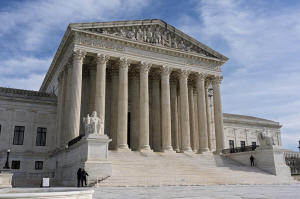|
In a 5-4 decision, the court sided with a man who came from
Mexico illegally as a teenager and had lived in Colorado for
nearly two decades before he was ordered to leave in 2021. The
case was argued in November 2024, days after Trump won
re-election. Several other new immigration cases have since come
before the court on its emergency docket.
In the case of Hugo Abisai Monsalvo Velázquez, the Supreme Court
majority found that a Saturday deadline to voluntarily leave
should have been extended to the following Monday.
“Here, as elsewhere, the term ‘days’ operates to extend a
deadline that falls on a weekend or legal holiday to the next
business day,” conservative Justice Neil Gorsuch wrote in the
opinion, which was joined by Chief Justice John Roberts as well
as the court’s three liberal justices.
The other four conservatives disagreed, finding that the
justices should have sent the case back to a lower court to
decide whether federal courts have jurisdiction over this kind
of dispute. Justice Samuel Alito also wrote in a dissent joined
by Justice Brett Kavanaugh that the majority’s opinion amounts
to an unwarranted two-day extension.
“The Court is sympathetic to petitioner’s plight, but the
relevant statutory provision sets a deadline, and no matter how
such a deadline is calculated, there will always be those who
happen to miss it by a day or so,” Alito wrote.
Monsalvo Velázquez was born in Mexico and came to the U.S. in
2004, according to court papers. He settled in the Denver area,
where he played high school varsity soccer, attended community
college and worked for local businesses. He got married, and the
couple bought a house and had two children.
He had recently opened his own auto-detailing service shortly
before he was ordered to leave the country in 2021. He was
allowed to “self deport,” and an immigration judge set a 60-day
deadline to leave that fell on a Saturday.
Monsalvo Velázquez filed a motion to reopen the proceedings late
the Friday before the deadline that was docketed the following
Monday. It was rejected by the Board of Immigration Appeals and
a federal appeals court. Immigrants who do not leave within the
required period face removal, fines and ineligibility for most
forms of immigration relief for 10 years.
All contents © copyright 2025 Associated Press. All rights
reserved |
|




